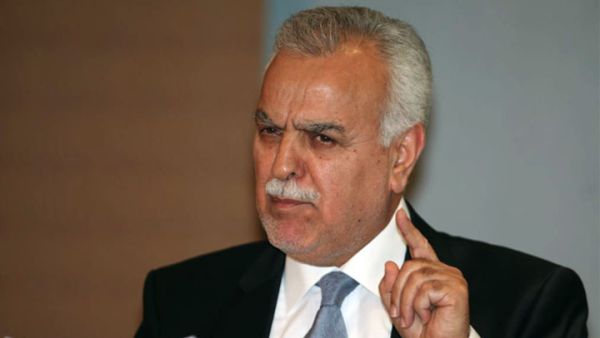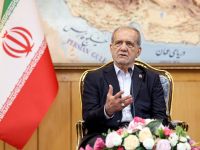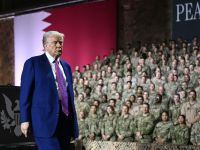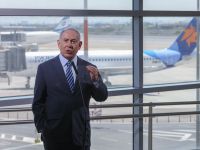Iraq’s fugitive Sunni Vice President Tareq al-Hashemi, who fled the country in December 2011, has told The Daily Star Iraq may be facing an Arab Spring-like uprising, but that it does not necessarily need to start from scratch.
In an extensive interview, Hashemi, currently seeking refuge in Turkey and facing multiple death sentences in his home country, covered Iraq’s current internal political upheaval, the Syria crisis, the rise of political Islam and Iran’s role in the region.
Now in his 80s, the vocal opponent of Shia Prime Minister Nouri al-Maliki was speaking after the eruption of Sunni-led protests mainly in the Sunni majority Anbar region against the Maliki government. The following are excerpts from the interview.
Q: Your statements on Iraq look like a forecast of an Arab Spring type uprising in Iraq. How will such an uprising take shape?
A: What is going on in Iraq is similar to the Arab Spring countries in the sense that it is an uprising against despotism, injustice and corruption. In this case, Maliki’s regime is no different from others that have witnessed revolution. However, the difference is that Iraq has a constitution, institutions and political experience acquired 10 years ago. We can say that the change in Iraq is still needed, but it doesn’t have to start from zero like other Arab countries.
Q: Do you think Iran would ignite a sectarian conflict inside Iraq if it saw its grip on Iraq failing? And how do you see the Sunni-led protests in Iraq playing out in terms of the broader Sunni-Shia conflict in the region?
A: Violence is not on the agenda of those who are protesting. They want a peaceful uprising compliant with the constitution. But everyone knows that Maliki and all those who stand behind him are not parties to peace and will seek any excuse to commit violence against protesters.
Maliki’s speech and [that of] other Iranian leaders clearly show that they are pushing events in the direction of a new sectarian conflict to get out of the mess they are in. Despite the strict discipline in the protesters’ political speech, Maliki’s provocation and sectarian incitement continues. In this case the protesters have a right to defend their stance in any way appropriate.
Q: You have claimed Sunni-dominated Iraq governorates are subjected to sectarian cleansing. How is this taking place and how will your front address it?
A: The sectarian cleansing has many forms, starting from assassinations, to car bombs, to the confiscation of property, displacement, deprivation of freedom, torture, rape, kidnapping, vandalizing of holy sites, verbal attacks, raids, pressure and intimidation.
They have launched psychological warfare to change the identity and belonging of Sunni people. Sunnis form the majority of those detained, displaced and seeking asylum. This amounts to sectarian discrimination that can be described as cleansing.
The solution to fight this unprecedented injustice [is] gathering all Sunnis, closing ranks and uniting our voices. We need to present a national plan that would lay out the basis for true partnership between the main Sunni entities, respecting justice and equality.
Q: What is the role of Turkey and other Sunni Arab countries?
A: We very much need our Arab and Muslim brothers and we hope to keep the atmosphere peaceful. The assistance needed remains political, media attention and aid.
Q: Political Islam is rising in the region – in some cases, organizations have gained power. Do you see a unified vision for political Islam in the Arab world?
A: It is a political leadership experience like any other. But it could face flaws and failure. Arab people must be patient and avoid prejudice. They must give the new rulers a chance to prove themselves, give them confidence and empowerment. We are far from the end of the road. The citizen is in charge of the situation and through his voice new leaders are named. All the regimes will be affected in one way or another, and no regime will survive as an isolated island without being concerned with its surroundings. This is the age of freedom, justice, and public participation.
Q: How do you see the results of uprisings in countries with diverse sects and religious affiliations?
A: Each country will have its own experience but everyone must respect the principle of real power-sharing, otherwise the political process will become hopeless, as it has been in Iraq.
Q: How do you perceive Iran’s role in the Arab world?
A: Iran is rejecting any interference in its own affairs. We have the same stand and sensitivities. But Iran is not only interfering; it is expanding its influence and interests in all Arab and Islamic countries. It harmed Islamic brothers, ignited conflict and weakened states.
Q: How long will Syrian President Bashar Assad’s regime last? Do you see any settlement in the horizon?
A: There are many factors in Syria, above all the international community’s stance. Almost all the countries in the world are morally responsible for the killings and destruction by the Syrian regime against its people. If the resistance could be unlimitedly supported the way the Syrian regime is supported by Russia, Iran, Iraq and Hezbollah, the balance of power would have changed quickly, but Israel doesn’t want that.
Q: The Syrian crisis took a turn with the emergence of Islamic groups in territories where the regime had lost hold. What do you think of their performance?
A: Those fighters worked with purpose and relied on God. I hope they will unite under one banner and have a common plan. This approach is needed not just to manage the conflict, but also to guarantee the required stability in the post-regime stage. The Arab media should not be drawn into what Western circles want to promote as pretexts for their agendas suspected of depriving the resistance from the needed support. The West is exaggerating the issue of Islamic extremism – even though it is a negative phenomenon. The priority is to overthrow the regime.
Q: Where does your case stand now regarding the death sentence issued by Maliki? Are you acting alone?
A: Maliki has issued five death sentences against me, and 24 similar sentences against my bodyguards. All are innocent, under the current judicial system Iraq, and that is what the latest reports of Amnesty International, human rights organizations and the international press have proved.
The Islamic Arab world stands by me. I am positive that God will not leave me, nor leave tens of thousands of innocent Iraqis behind bars, awaiting verdicts with no legal representation, as is required by international law. What happened to me is part of the religious cleansing of Sunnis in Iraq.
I am the sixth Sunni politician to be politically targeted, followed by Finance Minister Rafeh al-Issawi ... and there are more to come. It seems there is no place for Sunnis in new Iraq under the Safavid regime, but we will not be silent and will not surrender. Our revolting millions are the proof of that.








